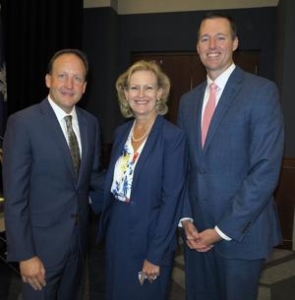At Florence Chamber Breakfast, Leaders Give Update on Healthcare
by Ardie Arvidson
Three leaders in health care community spoke to an audience Friday morning at the Florence Center about the trends in area health services.
The Greater Florence Chamber of Commerce’s annual Legislative Breakfast focused on health care instead of government this year.
Kyle Baxter of MUSC – Florence Medical Center, Carl Humphries of HopeHealth, and Donna Isgett of McLeod Health, spoke about what each of their health care facilities has to offer and what’s new on the horizon for health care in this area.
Humphries, chief executive officer with HopeHealth, said HopeHealth is a community owned and operated nonprofit business that provides access to quality primary and preventive health care that is affordable to everyone. He said HopeHealth serves those with limited access to health care, which could be the result of lack of health insurance or lack of a primary care physicians.
“We take anyone who walks through the door,” he said.
Humphries said HopeHealth served more than 41,000 patients in 2018 with primary and preventive care, specialty services, women’s health services, infectious disease, diabetes and nutrition services, laboratory and pharmacy services and dental care.
“We get grant dollars, but they total less than 10 percent of our funding,” he said.
Humphries said all donations to HopeHealth go directly to patient care.
He also talked briefly about the Affordable Care Act (Obamacare), its goals and how effectively those goals have been accomplished. He said ACA was signed into law in 2010 with the goal of protecting people with pre-existing conditions, expanding Medicaid to people at 133 percent of the poverty level, allowing children to remain on parent’s insurance longer and requiring Americans to purchase insurance.
Humphries said the ACA did reduce the number of uninsured Americans. He said the majority of those still uninsured are eligible for some type of assistance. Under the Trump administration, Humphries said, the individual mandate for health insurance has been eliminated.
He also commented on a 2018 Texas lawsuit challenging the constitutionality of the ACA. He said it would not likely go to the Supreme Court until next year, and those currently insured will likely retain their insurance through 2020.
Looking to the future, Humphries said, “In the next five years we strive to improve the health outcomes of 100,000 people and prevent at least 5,000 hospitalizations – saving hospitals, governments and insurers in excess of $50 million.”
Baxter, chief operation officer with MUSC Health – Florence Medical Center, said health care is rapidly changing. He said there is a lot of consolidation going on in the industry.
MUSC Health acquired Carolinas Hospital on March 1.
MUSC Health – Florence Medical Center provides 396 beds with two campuses. It provides the community with open heart surgery, a chest pain center with PCI, a Level 3 trauma unit, acute inpatient rehab, and a medical detox facility.
Baxter said that 25 years ago there were no urgent care facilities. He said now everyone wants immediate access to health care.
He said it is about consumerism.
Baxter said patients want lower cost, convenient care delivery and better management of chronic illness and outcomes.
He said they want “quick and easy access to any and all services.” He said this includes both physical and virtual services. Consumers expect the convenience of online self-scheduling, extended and walk-in hours, and urgent care. They want automated appointment reminders, centralized call routing, electronic messaging and same-day communication with provider.
He said one size does not fill all. He said those in the 18-29 age bracket are more digitally fluent. They read reviews, compare prices, and seek providers offering maximum convenience at the lowest cost, and they will post reviews online, while on the other end of the spectrum those 65 and over seek more traditional care. They are the most loyal age group and are less likely to travel for care, he said.
He said MUSC Health is a national Tele-Health leader, and is engaging in innovative partnerships with others.
He said MUSC patients want access to online scheduling, after-hours and urgent care, E-visits, FastPass, CareLink and Telehealth.
He said MUSC Health – Florence Medical Center’s future will include such things as a weekly transplant clinic for kidney, lung and liver patients, Charleston Specialty and Subspecialty clinic office in Florence, more opportunities for community partners to collaborate in research and more business health and wellness sites for the convenience of employees and clinical trials in Charleston available in Florence.
Isgett, chief operating officer at McLeod Health, applauded the fact that all three hospitals represented at the breakfast are not-for-profit entities.
She said McLeod Regional Medical Center is the top employer in Florence County and it contributes much to the area.
Isgett said McLeod wants to be not a choice but “the” choice for excellent health care.
She said McLeod has built a new emergency department to better service its customers.
She said their vision is to be the region’s choice for medical excellence. Their mission is to “improve the overall health and wellbeing of people living within South Carolina and eastern North Carolina by providing excellence in health care.”
“We are local people taking care of local people,” she said.
Isgett said McLeod is committed to providing quality care.
McLeod represents 18 counties in seven hospitals, 8,500 employees and 90 medical practices.
She said McLeod is committed to the rural areas of the Pee Dee and discussed the services McLeod currently provides in Dillon and Darlington and at McLeod Health Cheraw and McLeod Health Clarendon.
Isgett said the future vision is a focus on service excellence, enhanced access, recruitment of medical specialists and improved cost efficiencies.
She said McLeod is thrilled to partner with MUSC Health Florence Medical Center for transplants that McLeod doesn’t do.
“We feel the future is very bright,” she said.
She said all three facilities are committed to serving this region with quality, cost-effective care.
After the presentations a question was directed to all three speakers from the audience on the opioid crisis in this area.
Isgett said McLeod Health has looked at its ordering patterns and at how much is really needed among other things.
Humphries said HopeHealth is growing its pain-management program and helping people focus on the root cause of their pain.
Baxter said MUSC Health Florence Medical Center has a detox program and is working in other areas to combat the problem.
To view the full story on SC Now, click here.





